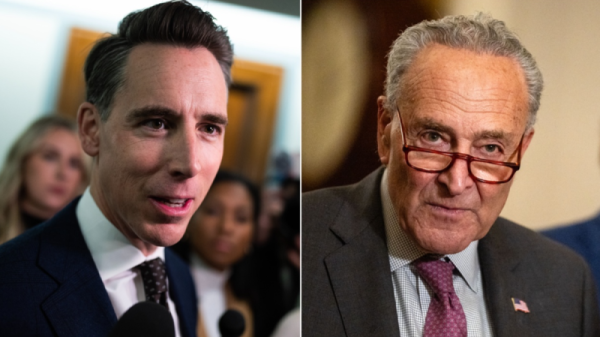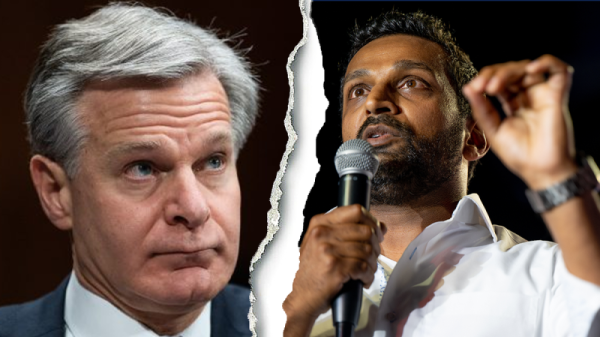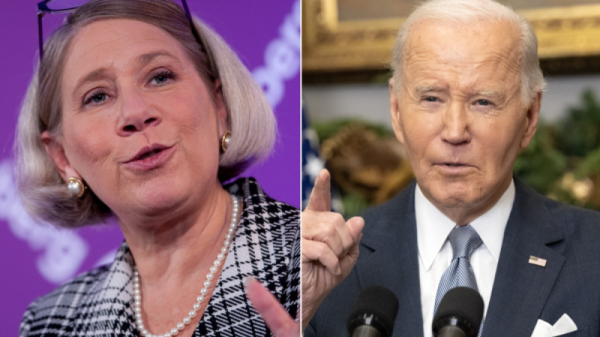HUNTINGTON BEACH, Calif. — This oceanside enclave is a lot like the rest of coastal California: Its signature pier juts into the Pacific as waves big enough to make surfers salivate break beyond miles of white sand.
But when it comes to politics, this city of 200,000 south of Los Angeles loudly defies the blue-state stereotypes.
Lately, the beach town has become a battleground, its council chambers a coliseum for culture warriors. The conservatives who now control city government have pursued policies that position Huntington Beach as the ideological counterweight to the state’s liberal leaders.
In the past year alone, the council — which is technically nonpartisan like all local bodies in the state — has championed a laundry list of MAGA priorities: It barred the Pride flag from flying on city property, banned mask and vaccine mandates, established a panel to review children’s library books for sexual content, and condemned President Biden’s immigration policies.
Now the upcoming March election could serve as a referendum on the city’s rightward lurch, with several contentious measures on the ballot, including the flag issue and a proposal that would require voter identification for local contests, which would violate state law and probably spark a legal battle — just the type of fight the council’s Republicans relish.
“We’re living in a state that’s not welcoming to us; conservative values are not really welcomed,” said Gracey Van Der Mark, Huntington Beach’s mayor and one of the council’s four Republicans. “We just want a safe space for people who share our values. And why shouldn’t we have that?”
Huntington Beach, one of Orange County’s largest cities, has long been associated with conservative beliefs, but its evolution in recent years shows how the bitter polarization of national politics has crept into even the most mundane municipal matters.
“It’s the tipping on its head of the old notion that all politics is local. Now, all politics are national, and I think the overall effect of that is really destructive,” said Jim Newton, a public policy lecturer at UCLA and editor of Blueprint magazine. “It takes a sharply divided country at the national level and drags that down into local disputes.”
Like much of Southern California, modern Huntington Beach was shaped by industrial tycoons. The city bears the name of railroad magnate Henry E. Huntington and oil pumps still dot the landscape, if less bountiful as housing prices have spiked.
Spurred by those early oil booms, the city embraced development and corporate interests, said Chris Jepsen, the president of the Orange County Historical Society, earning it “a reputation for being pro-business and ardently pro-property rights.”
Still, longtime residents say Huntington Beach’s politics remained largely focused on hyperlocal issues.
“Politics, Democratic or Republican, were not particularly important,” said Tom Harman, a former Republican state senator who got his start on the city council in the 1990s. “People didn’t run on party preference. They ran on what they could do in the community and how they could make the city a better place to live.”
Around the time Harman joined the council, the city was working to burnish its national image. It had long been a destination for surfing, but officials in the ’90s began leaning into that reputation to court the tourism industry. Huntington Beach became “Surf City USA,” a moniker pulled from a chart-topping song.
But the city’s growing status as a “hotbed for skinheads” complicated its family-friendly marketing campaign. Two high-profile acts of white-supremacist violence — the shooting of a Black man in 1994, and the stabbing of a Native American man two years later — prompted the city to crack down on the groups who had flocked from across Southern California.
City police stepped up patrols, the council passed a human dignity policy condemning hate crimes, and officials started a human relations commission to combat bigotry. Ken Inouye, the founding chair of that task force and a 51-year resident of Huntington Beach, said residents from across the city “came together because we knew we were better than that.”
Both efforts were reversed when the current Republican majority took over the council.
Shirley Dettloff, a Democratic former mayor, said she worked with Republicans during her tenure from 1994 to 2002, tackling issues like local wetland preservation and library expansion. Lately, Dettloff has found herself back in the council chambers, protesting the conservative majority’s agenda.
“We wanted a better place and that’s what we worked so hard to build, and we’re protecting what we achieved at that time,” she said. “We don’t want to go back to the days when people had to be afraid to live here.”
In recent decades, sweeping demographic change has pushed Orange County to the left. But those shifts have been more subtle in Huntington Beach, and the city has retained its rightward lean. Unlike the county’s other largest cities, most residents are White and Republicans still account for the plurality of Huntington Beach’s registered voters.
During Donald Trump’s presidency, residents bridled at California’s pandemic restrictions, much as Trump did. Fierce protests became common, with crowds clogging the pier and Pacific Coast Highway to shout down coronavirus precautions or cheer Trump. Some of the rallies were organized by white-supremacist groups and turned violent.
Another inflection point came in 2021, when former mixed martial arts fighter and hard-right council member Tito Ortiz resigned from his post and the remaining members appointed a Democrat, Rhonda Bolton, in his stead. The move infuriated city Republicans, who wanted Ortiz replaced with an ideological equal.
Bolton, who is the council’s first Black member, said that in her 2½ years in office, she has seen the discourse in the chamber devolve.
“The tone of political rhetoric has gotten coarser and sillier as time has worn on,” she said. “And Huntington Beach is a reflection of what’s happening nationally.”
The change hardened following the 2022 election, when four Republicans swept into office and secured the council majority after running as a partisan slate.
One of them, Tony Strickland, a veteran state legislator, said he convinced the other three conservative candidates to team up, arguing that a split vote could deliver Democrats another council seat.
Strickland said he’s proud that the city has picked so many fights with state leaders but argued that the council has also successfully tackled important local issues, like closing a budget deficit and hammering out a new police contract.
“We’re proving that conservative leadership works,” Strickland said. “Of course, liberals who don’t like that policy are going to be upset, just like most of Huntington Beach was upset with the previous council. That’s why we have elections. We have a majority, and if people don’t like what we’re doing, we won’t be in the majority long.”
An increasingly organized faction of activists, however, is fighting to send Strickland and his Republican colleagues a message. Protect Huntington Beach, or Protect HB, a community group led mostly by retirees and former city lawmakers, formed late last year to protest the Tuesday charter amendments backed by the Republican council majority. The group has grown to about 500 members and has become a constant presence at council meetings.
Carol Daus, who has lived in the city nearly three decades, said the council’s focus on contentious cultural debates has divided the community, pitting neighbors against neighbors. One example of the acrimony: Protect HB has hung posters across the city urging a “No” vote on the March ballot measures, but some 40 of those signs were recently vandalized with large green “Yes” stickers.
“This city during the past several years, following the Trump administration and covid lockdown, was like a volcano ready to explode,” Daus said. “And now it has.”
While the council appears to retain strong support among conservatives, some have grown disenchanted.
“I feel duped,” said Sue Welfringer, a longtime Huntington Beach resident and registered Republican. She voted for the four-person conservative slate because she liked their stances on homelessness and limiting development, but mostly she appreciated that they got along with each other.
“I almost don’t even want to vote at all because I don’t want to make another terrible mistake I regret,” said Welfringer, who opposes the council’s stances on issues like LGBTQ rights and voter ID. “I feel like they had a hidden agenda. And now I’m also worried what else is on their hidden agenda. I’m afraid to know what big issue is next.”
Perhaps the fiercest municipal faceoff is not on the Tuesday ballot.
As in communities across the country, those on the right are seeking to limit children’s access to books they deem pornographic and those on the left are painting that effort as censorship.
In October, the council’s conservative majority voted to establish an advisory board that would review public library books for sexual content and decide whether they should be relocated from the children’s section to another part of the building. Last month, librarians began the recataloging process, which one described as arduous and confusing.
Huntington Beach’s central library is beloved across the city. The building, designed by Richard Neutra’s legendary Southern California architectural firm, is an arresting structure of concrete and glass, full of flowing water and plants that looks out toward a sprawling park.
Lately, local students have begun speaking out, criticizing the council for politicizing the place they go to write their term papers.
“The fact we’re trying to limit what people will read is scary,” said Briana Lee, a senior at Huntington Beach High School who, like many of her friends, will soon move away from her conservative hometown for college. “I want to make the city a better place for the people who still have to live here.”
Van Der Mark, the city’s mayor, championed the new policy and stressed that it is not “banning” books from the library; rather, it moves them from the children’s section to upstairs, where members under the age of 18 would need a parent’s permission to check them out.
Pano Frousiakis, a member of the city’s public works commission who is now running for the county’s water board, said he backs the council majority and sees the focus on national issues as an unfortunate fact of modern politics.
“Ideally, it would be wonderful if we could just focus on the roads and infrastructure,” he said. “But I think we’re in a time now where there really isn’t any such thing as a nonpartisan local focus anymore.”
But this dynamic has turned city council meetings into routine spectacles, where public comment drags on for hours and speakers hurl invectives at the seven members sitting on the dais.
Butch Twining, a candidate for city council, is one of three conservatives looking to build on the Republican majority, campaigning as a slate to replace Bolton and the council’s other two liberal members in November. A victory would give conservatives a 7-0 vise grip on the council.
Twining said he supports the council’s approach but lamented that the attention it brings tends to overshadow other aspects of the city where he’s lived for nearly 60 years.
“I don’t like for us to be considered the MAGA capital of the world or the anti-woke capital of the world,” Twining said. “I just want us to be known for the great people, great beaches, great leadership, great downtown, great surfing.”


































